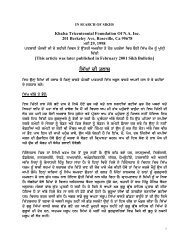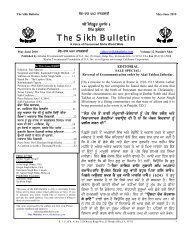hirmMdr ik drbwr swihb - The Sikh Bulletin
hirmMdr ik drbwr swihb - The Sikh Bulletin
hirmMdr ik drbwr swihb - The Sikh Bulletin
You also want an ePaper? Increase the reach of your titles
YUMPU automatically turns print PDFs into web optimized ePapers that Google loves.
<strong>The</strong> S<strong>ik</strong>h <strong>Bulletin</strong> mwG-Pgx 542 nwnkSwhI January-February 2011<br />
dal. <strong>The</strong> whole thing is highly organised - from<br />
arranging the material to cooking and then serving.<br />
After eating, the utensils are collected in one part of the<br />
hall in huge bins from where they are taken away for<br />
washing. Once cleaned, the dishes are quickly but<br />
neatly stacked in huge, wheeled storage bins, ready to<br />
be used again for the next sitting.<br />
Aashima Seth Captured on film Belgian filmmakers,<br />
Valerie Berteau and Philippe Witjes, who were so<br />
impressed with the langar at the Darbar Sahib that<br />
they made a documentary film on it. Entitled<br />
Golden Kitchen, the film has impressed audiences at<br />
numerous film festivals in Europe. On June 6 this<br />
year, it was adjudged 'Outstanding' at the Festival<br />
of Short Films organised at the New York Museum<br />
of Modern Art.<br />
Critics have praised the film for bringing out the<br />
beauty of what is for western audiences "an<br />
endeavour that is remarkable in scale, the<br />
clockwork efficiency with which the kitchen is<br />
organised and the fact that all the people manning<br />
the kitchen are volunteers who are inspired to<br />
undertake the heavy labour by their religious<br />
convictions."<br />
IN THY SERVICE around 3,000 people are served<br />
meals at a go. It wouldn't be possible without<br />
sewadars, who look for no return except<br />
Waheguru's blessings.<br />
*****<br />
SIKHISM, HINDUISM AND<br />
PASSIONATE EDITORIALS<br />
Karminder Singh Dhillon, PhD (Boston)<br />
Kuala Lumpur, Malaysia<br />
I am drawn to SP Sidhu’s comments regarding<br />
Shergill’s “passionate editorials “(Letter to the Editor,<br />
SB Nov-Dec 2010). Two issues in Sidhu’s letter are<br />
of particular interest and I pray my comments, inspired<br />
in turn by Sidhu’s passion would be of some help.<br />
FIRST ISSUE: Within paragraph 6 of his letter, Sidhu<br />
writes: “I can tell you not one or two, but numerous<br />
things S<strong>ik</strong>hism shares with Hinduism. I would be much<br />
obliged to learn from you the real differences between<br />
Hinduism and S<strong>ik</strong>hism. List please!”<br />
It’s a pity that Sidhu did not himself list out the<br />
“numerous” or even “one or two” similarities between<br />
both faiths for us readers to have benefitted from his<br />
insights. Such oversight notwithstanding, the<br />
following two foundational differences between the<br />
two spiritual paths may be worth pondering.<br />
<strong>The</strong> root Hindu belief with regard to God is rooted in<br />
trinity and its accompanying traits. It is a trinity in<br />
which each of its powers is autonomous and separate.<br />
Bhrama the single creator is independent from the<br />
other two. Vishnu the sustainer is self-governing and<br />
self ruling in that he does not consult with the other<br />
two as well. Similarly, Shiv is self directing, detached,<br />
and self governing in matters concerning death and<br />
destruction. <strong>The</strong> powers of the trinity are thus<br />
independent and sovereign. <strong>The</strong> origins of their power<br />
are self derived. For this reason, the Hindu faith<br />
system as represented by the place and method of<br />
spiritual entreaty is based on one of the three, but not<br />
in combination. For instance, one finds a Vishnu da<br />
Mandir, and within it devotees of the God of Life.<br />
Outside of that, one finds a Shiv da pujari but not<br />
within a Vishu or Bhrama da mandir. Similarly a<br />
Bhrama da bhagat is just that – a devotee of the Hindu<br />
God of creation. A cursory survey of the Hindu<br />
mandirs would reveal that out of twenty mandirs (and<br />
devotees, one would imagine) seventeen would belong<br />
to Vishu or his reincarnations, two to Shiv and one to<br />
Bhrama. <strong>The</strong> logic of the numbers at first glance is<br />
simple practicality – it is matters pertaining to life and<br />
its sustenance that most humans are concerned with.<br />
Humans do fear death and hence have chosen not to<br />
discard Shiv in prayer completely – hence the two<br />
K. T. F. of N. A. Inc. 3524 Rocky Ridge Way, El Dorado Hills, CA. 95762 6

















